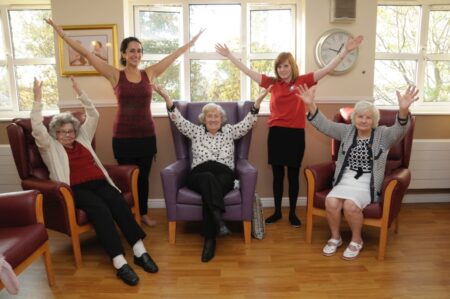Home News & Views Learning from and with FoNS
Learning from and with FoNS
Tania Plahay, Yoga 4 Dementia

In June 2016 I finished working on a project supported by FoNS called ‘Yoga for people living with dementia in residential care settings’. For more information about the project here is a link to the recently published project insight.
In reflecting back on my personal journey with this project I wanted to share some key insights gained through the support of FoNS.
When I first started volunteering in care homes I was passionate about bringing the simple practices of yoga to those living in residential care. However, not having a medical or nursing background I had no idea what practice development was or how it could help with the introduction of yoga into health care settings. Through the support of FoNS over 18 months, I learnt the importance of putting people at the centre of our decision-making. This presented some challenges for those living with dementia, as they sometimes could not communicate their wishes in the same way as others. We discussed this on one of the workshop days and one of the solutions we came up with was the importance of involving carers who knew the clients well. This helped us understand the non-verbal cues as to whether a client was enjoying the sessions or not. Having carers on hand helped a wider range of clients to participate, including those who might need more assistance during the session.
A common misperception about yoga is that it is about contorting your body into prezel like positions. It was therefore very important in this project to begin by changing this perception. We worked on this by running a workshop with all levels of staff at the home. Jo Odell facilitated this using creative and fun techniques to explore ideas of how to put patients first and how yoga could help. Participants benefited from learning some simple yoga and breathing techniques. I feel this engagement with the wider team, and not just those who were directly involved in the yoga, was key to the success of the project. The day-to-day running of a home is complex and introducing any new activity requires wider level support.
The outcomes of the project were positive not just for those living with dementia, but also for staff in the home. The project and my learning from it were key to my new book on this subject ‘Yoga for Dementia’. In the book I include a specific section for carers or activities coordinators who wish to run yoga sessions in residential care environments.
One of the other things I really benefited from the programme was the importance of self-reflection. This is also something I have included in the book. For example, before working with someone living with dementia, I have encouraged readers to reflect on their own mood and energy levels. Writing this blog post has helped me reflect back on my journey with FoNS and how much I gained from learning about practice development, and the support of the other fantastic teams.
Comments are closed.

